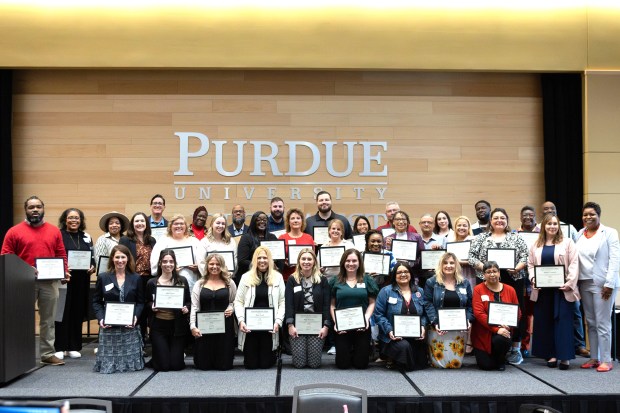When the Crown Point Community Library underwent a building project at its Winfield branch, workers had to move the branch’s bookshelves. After they’d been moved, staff found books that had been hidden.
All books that were found had been challenged, said Julie Wendorf, the library’s director and president of the Indiana Library Federation.
“They’re mostly LGBTQ materials that are found under the shelves,” Wendorf said. “It’s quite suspicious that they would only be of that topic matter.”
The library has seen other methods to remove challenged books, such as finding them in trashcans.
Library staff have found books that aren’t challenged hidden as well. In 2023, a patron asked about Christian books, found them near Islamic books and moved more than 30 books throughout the library, either in between or behind shelves.
Wendorf doesn’t expect to see the book challenge trend decrease in the next four years.
“Indiana is not alone in this,” she said. “It’s been an issue in Iowa, Texas and Florida. Many states have some similar trends in book banning and limiting materials at school libraries and public libraries.”
A challenge is an attempt to remove or restrict materials, according to the American Library Association. Books are usually challenged to try to protect children from difficult ideas, according to the ALA. Challenges lead to censorship.
In 2023, Indiana House Enrolled Act 1447 required school libraries to implement a process for people to contest books or other materials that are deemed obscene or harmful to minors, according to Post-Tribune archives. School librarians can be charged with a Level 6 felony if they are determined to have shared harmful materials with children, Wendorf said.
Public libraries were originally included in the legislation.
Wendorf spoke against the act, and the Indiana Library Federal negotiated against public libraries being included.
“The major danger in censorship is you’re eliminating access to materials,” Wendorf said. “The items that typically get challenged could include racial books but also often LGBTQ books. (Censorship is) limiting access to books, and those people can’t see themselves represented in books.”
In 2023, the ALA reported a record number of book titles that were challenged, seeing 4,240 unique titles targeted in schools and libraries.
Between Jan. 1 and Aug. 31, 2024, the ALA tracked 414 attempts to censor library materials and services. In those, 1,128 unique titles were challenged.
In Indiana, three attempts were made to challenge books in 2023, with three titles mentioned, according to the ALA.
If patrons have an issue with a book, they can go through the library’s reconsideration of materials request. Library staff can connect patrons with the person who bought materials, and after that, patrons can fill out a form that says what their concerns are. Wendorf will look over the form and respond with the library’s decision.
Patrons can appeal the decision if they don’t find it satisfactory.
Typically, people who hide challenged books aren’t submitting reconsideration requests, Wendorf said.
As president of the Indiana Library Federation, Wendorf said she’s heard other libraries have issues with missing challenged books.
“I think it’s something that happens in a lot of libraries in terms of having materials go missing,” she said. “But, we do have areas where we have very active book-banning movements.”
The Lake County Public Library has seen challenged books go missing, said Executive Director Carol Daumer Gutjahr, but it’s difficult to tell if they’re missing on purpose.
For instance, the library has two missing copies of “To Kill a Mockingbird,” which has been included on the ALA’s most challenged books list, most recently in 2020.
“We do see books that are lost all the time, but we don’t always know the reason for that,” Daumer Gutjahr said. “That could be because they were actually lost. Maybe they left it, by accident, at the airport when they went on vacation and can’t return it to us. Maybe it was damaged, and the condition is too poor to bring it back, so they’ve just kept it.”
Daumer Gutjahr is sure that people have purposely taken challenged books to get them off library shelves. Library staff know that popular and challenged books might go missing, and they’re going to make every effort to replace them.
“If the intent is to steal it and keep others from reading it, it’s not going to work,” she said.
The LCPL doesn’t track how many challenged books go missing, Daumer Gutjahr said, but staff can find data on lost books in the system.
The executive director said she thinks large library systems have difficulties tracking challenged books that are missing because they have a larger amount of circulating materials.
The LCPL buys materials that are representative of the community and what patrons might find interesting, Daumer Gutjahr said.
“We’re making sure that (materials are) properly balancing subjects within our collection,” she added. “We want to make sure that we have all viewpoints. We don’t want to have anything one-sided, we want people to be able to come in and see the pros and cons.”
Daumer Gutjahr doesn’t know if libraries will see issues with more challenged books in the next four years. In 2024, the LCPL didn’t see more objections to materials, but it’s difficult to tell what the future holds.
“Patron involvement is always welcome, but we will look at any request to remove materials very carefully,” she said. “We will thoroughly look at it before we make a decision.”





